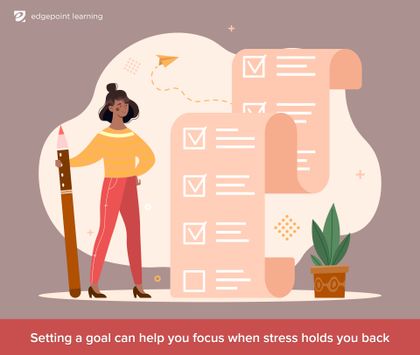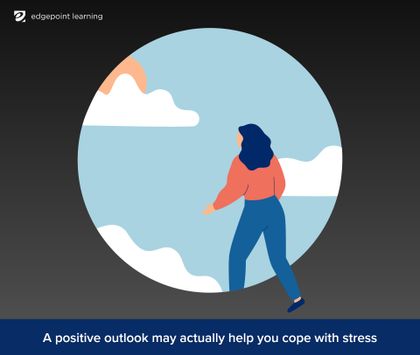Stress Management Help for Employees: 11 Tips for a Better Life
🍿 6 min. read
A looming work deadline. A presentation in front of company VIPs. A flight cancellation on the day of your big vacation. A fever in your house right before bedtime. Life happens, and we can get stressed out. If we’re not careful, that stress can go unchecked and become a permanent part of our life—causing constant anxiety and worry even when there’s nothing to be stressed about! But what if there were ways to improve our stress management and live a calmer, more balanced life?
Luckily, there are. Let’s learn more about what stress is, and how you can tackle it!
Stress is more than a feeling
According to the National Institute of Mental Health, stress is “the physical or mental response to an external cause….” But here’s the thing: Even when the external cause of stress is gone (the report is handed in or the bus finally arrives), stress can still gnaw at you—even manifesting as anxiety.
That’s a big problem. According to the Mayo Clinic, constant stress can wreak havoc on your physical and emotional life, and even affect your behavior. Some common stress side effects include:
- Headaches and muscle tension
- Chest pain
- Fatigue
- Sleep issues
- Irritability
- Panic attacks
- Depression
And if that’s not enough to convince you to manage stress, try this: According to The American Institute of Stress, stress is a leading cause of premature death. Stress management isn’t just something to think about or get around to when you have the time. It literally can be a life-or-death decision.
Stress management matters at work
Employees are on the front lines of the stress epidemic. The tension and pressure that can accompany a day in the workplace—either in person or remote—is often not left at work. Employees may check work emails during their downtime or feel the need to handle work projects after hours. That, coupled with other demands on their time in their personal lives, can all add up to problems for them—and their organizations.
The consequences aren’t small. In fact, the costs of workplace stress are astronomical. Some estimates say around one million workers miss work every day due to stress, adding up to over $300 billion a year for companies in health costs and performance.
These staggering numbers, paired with statistics that say 40% of job turnover is stress-related, means the time to act—and train—is now.
Managing stress is key—and it’s possible
When it comes to effective stress management, realizing stress is affecting you—or your employees—is the first step. The second? Taking action to help ensure it doesn’t get a stranglehold on your life. The good news is that there are almost as many ways to manage stress as there are people who want to manage it. It’s all about finding things that fit your interests and your lifestyle so that you’ll want to do what you need to do, when you need to do it.
Let’s take a look at some of the more popular stress-management techniques. And remember: If you don’t click with anything on the list, just use your imagination and come up with something that can help get your heart rate down and your commitment levels up.
1. Get relaxed
Relaxation techniques such as meditation, yoga, and guided imagery can help you carve out a quiet space during the day to breathe and focus. There are even apps you can download onto your smartphone to help you relax on the go!
2. Get moving
Exercise is a great way to de-stress and elevate your mood. You don’t have to run a marathon. Even a short walk in the fresh air can do wonders for reducing stress.
3. Get thinking
Although clearing your mind of thinking is a good stress reducer, thinking can help, too. Reflect on the things in your life that bring on stress and make a list. Then, think about some ways you can help to reduce that stress.

4. Get goals
Setting a goal can help you focus when stress holds you back. Examples of goals could be, “When I get home, I’ll take a 15-minute walk,” “I’ll meditate for at least 10 minutes before bed,” or “I’ll plan to take a vacation in one month.” When you’re overwhelmed, remember your goals, and strive to meet them.
5. Get writing
When stress is stuck in your head, get it out on paper. Spend some time writing about your day or the emotions you’re feeling, and see if it can unlock some new, positive energy and solutions.
6. Get sleep
If your sleep habits aren’t great, consider improving them to reduce your body’s cortisol (stress hormone) levels. Try for seven to nine hours. Turn off screens 30–60 minutes before bed and spend time stretching, reading, or relaxing instead.

7. Get positive
Positive thinking isn’t just wishful thinking. According to the Mayo Clinic, a positive outlook may actually help you cope with stress. When you catch your mind straying into negativity, stop and focus on something positive, fun, or funny. Look for the bright side.
8. Get nutrition
Healthy food can reduce stress. Certain foods—such as fish, fruits, and whole grains—can even help you lower cortisol levels. Strive for vitamin-rich, balanced meals, and it may just lead to a more balanced life.

9. Get away
The average employee leaves 9.5 vacation days unused. Use them. Whether you head for the sunny beaches or take a staycation around the house, find a way to unplug and unwind.
10. Get perspective
Work and other commitments will be there tomorrow. Your health may not be. Put your responsibilities into perspective. Try to stop treating every obligation as an emergency. Fill your cup when you can so that you are better able to tackle the important challenges when they come.
11. Get help
If you struggle with stress, sometimes it’s good to talk it out. If you’re comfortable, find a therapist, family member, or friend you can confide in, and tell them what’s going on. Get a fresh point of view. Sometimes the stress load is easier to lift with two.
Ready to help employees with better stress management?
There are many ways to reduce and manage stress, and everyone has the power to choose what works for them. But here’s the thing: We don’t know what we don’t know. Training employees on stress management is a way to open the door to knowledge, giving them the tools they need to start their self-care journeys.
Training employees to manage stress can help them prioritize self-care and lead to a happier workforce with a better work-life balance. And keep this in mind: Mental health disorders can be invisible. Employees who may be suffering could see organization-backed training as an invitation to get the help they need.
Courses on topics relevant to employee wellness—when part of a robust training program—can help employees take charge of their mental and physical health in powerful ways. Here are some examples:
- The importance of self-care
- Burnout awareness and prevention
- First aid or active shooter trainings to reduce stress around crises
- General mental health training on anxiety, depression, eating disorders, and other important topics
Let us help
EdgePoint Learning is here. We can help you discover what employees really need (and want!) to know with a comprehensive training needs analysis that can help you design training specific to your company, employees, and culture.
Get in touch. Let’s work together to solve the stress management problem.
